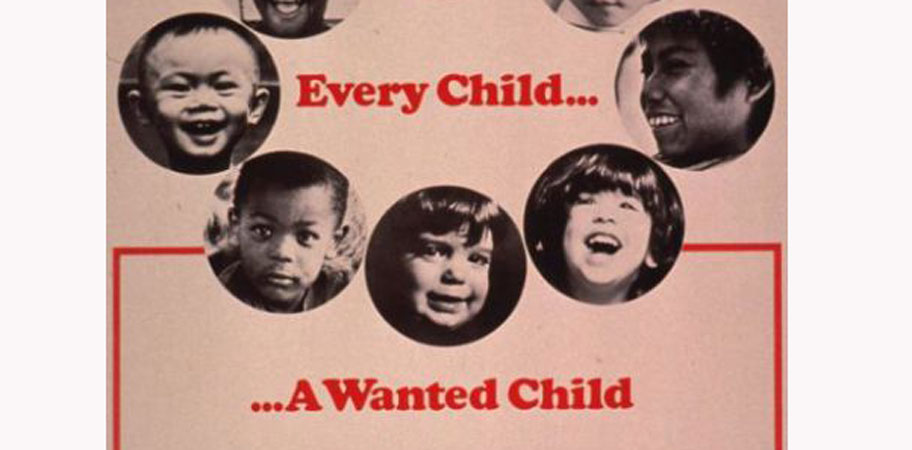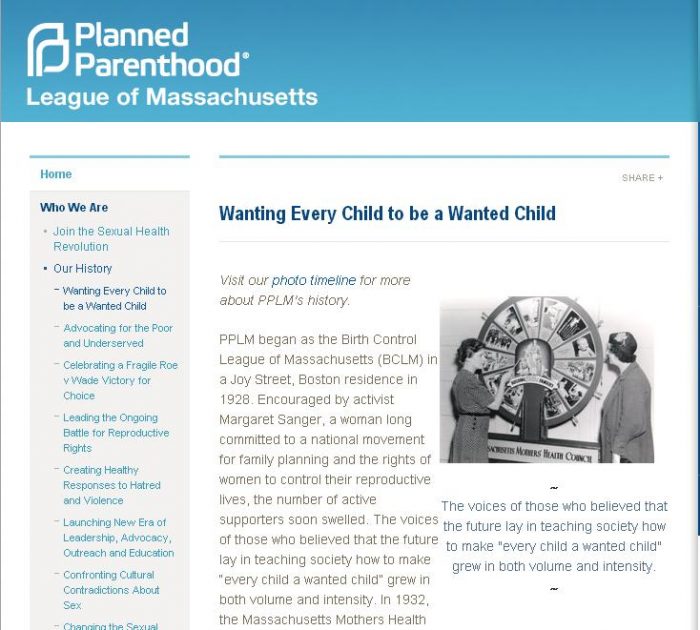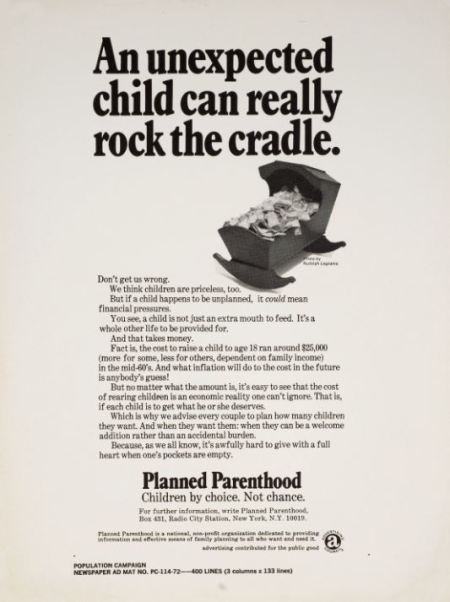
Planned Parenthood, children by choice, not chance.
Collection:
Images from the History of Medicine (NLM)
Since its inception in 1916, Planned Parenthood has used snappy sounding taglines that make them appear as if they are for “health” and families — but could Planned Parenthood’s cleverly crafted slogans be disguising their real mission of furthering eugenics?
This 1972 poster (pictured right) from Planned Parenthood reads, “We think children are priceless, too.” This was published one year before the infamous Roe v. Wade decision overturning state laws restricting abortion. However, despite the ad’s claim that Planned Parenthood viewed children as “priceless,” Planned Parenthood fully supported abortion, and was already providing them in New York and openly pushing for abortion’s legalization nationally. The ad is so manipulative that at the same time it claims children are priceless, it also claims they’re awfully expensive, stating: “But if a child happens to be unplanned, it could mean financial pressures. You see, a child is not just and extra mouth to feed. Its a whole other life to be provided for.” So, naturally, Planned Parenthood was more than willing to “help” by eliminating that life before anyone had to “provide[] for” him or her. “Priceless,” indeed.
Even the name Planned Parenthood is deceptive. It was created to sound appealing — because, naturally, “planning” is a responsible thing to do, so who wouldn’t want to “plan” for parenthood? — but the fact is that this abortion giant was steeped in eugenics from its beginning and even boasted a list of eugenics proponents as its board members and supporters for decades following.
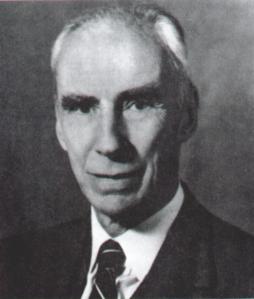
Frederick Osborn
Planned Parenthood’s past motto of “every child a wanted child” is misleading and very possibly originated in the eugenics movement. Fredrick Henry Osborn (pictured left), a founding member of the American Eugenics Society (AES) and president of AES in 1946, is believed to have played a part in the origin of the phrase. Osborn helped start the Population Council as well as the Pioneer Fund, both known for their population control agenda. He also signed Planned Parenthood founder Margaret Sanger’s “Citizens Committee for Planned Parenthood,” published in her review in April of 1938.
After World War II, many eugenics leaders were concerned that the Nazi Holocaust (inspired partly by the American eugenics movement) had negatively affected the public’s perception of eugenics. This led to the AES changing the name of their publication from Study of Social Biology and the American Eugenics Society to The Society for Biodemography and Social Biology. At the time of this change, Osborn correctly pointed out how abortion had also replaced the term “eugenics.” He wrote:
The name was changed because it became evident that changes of a eugenic nature would be made for reasons other than eugenics, and that tying a eugenic label on them would more often hinder than help their adoption. Birth control and abortion are turning out to be great eugenic advances of our time.
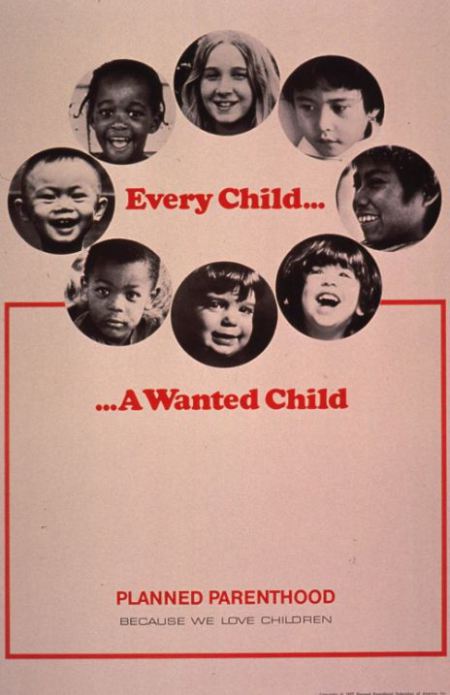
This Every Child a Wanted Child Planned Parenthood poster is from 1977
Osborn’s mission was to reinvent eugenics and make the concept more acceptable, something he believed his predecessors had not accomplished. According to author Edwin Black in his book on eugenics, War Against the Weak:
Osborn and his colleagues were searching for a new socially palatable definition of eugenics that would promote the same ideals under a new mantle. One Osborn cohort, Frank Lorimer, wrote Osborn, “Personally, I would redefine ‘eugenics’ to include concern with all condition affecting the life prospects of new human beings at birth.” He added the caveat, “This is a matter of strategy rather than ideology.”
Author Rebecca Messall adds some additional insight into Osborn’s views. Writing in The Long Road of Eugenics: From Rockefeller to Roe v. Wade, Messall states:
In 1940, Osborn received a public relations boost from Time magazine in an article titled, “Eugenics for Democracy.” The article described him as being “among the leaders of the new, environmental eugenics.” In the article, Osborn articulated the meaning of this new eugenics: “An environment equalized at a higher level would show up a superior heredity in great numbers of persons now at a low level of development.” He believed doctors should involuntarily sterilize the feeble-minded, but said a “sound population policy stresses ‘freedom of parenthood’—freedom not to have children unless they are wanted.”
Osborn’s idea of “freedom of parenthood” — or the more commonly used “every child a wanted child” phrase — soon adorned Planned Parenthood’s website and advertisements, and did so for years.
Planned Parenthood website slogan “Wanting Every Child to be a Wanted Child”
Today, Planned Parenthood is the nation’s largest abortion chain, admittedly performing well over 300,000 abortions annually while taking in half a billion dollars in revenue from American taxpayers each year. Since his tenure in office, President Obama has increased those dollars by 35%. Now, President Obama and Hillary Clinton, in agreement with the new Democratic Party Platform, have vowed to force taxpayers to directly fund abortion by calling for the repeal of the Hyde Amendment.

1959 Planned Parenthood ad in the Toledo Blade
Whether or not Planned Parenthood’s often repeated slogan originated from a former president of the eugenics movement, it is extremely backward to claim that a child has a “right” to be “wanted” but not a “right” to simply be born. Planned Parenthood, which has seen its legitimate health services decrease while abortions have increased, is “celebrating” its 100th anniversary. And while Planned Parenthood attempts to distance itself from its eugenic past, it remains tied to the vision of their founder, Margaret Sanger, who was a staunch eugenics promoter. Despite the fact that Sanger even once gave a speech to the Ku Klux Klan, Planned Parenthood praises her on their website, writing this on a page regarding the organization’s history:
Today we celebrate her [ Margaret Sanger] accomplishments, her pioneering work and her ideas. Margaret Sanger’s vision has inspired the availability of reproductive health care for women…across the nation.
And this:
Margaret Sanger, the founder of Planned Parenthood, is one of the movement’s great heroes. Sanger’s early efforts remain the hallmark of Planned Parenthood’s mission…
This becomes more disturbing when we recall what Sanger’s “vision” and “mission” were: to see to it that the “unfit” didn’t reproduce at all.
While Planned Parenthood attempts to disassociate itself from its eugenics beginnings, the truth is that the organization’s agenda has merely morphed under a new name: abortion. Given this, perhaps Frederick Osborn’s statement that “Birth control and abortion are turning out to be great eugenic advances of our time” has come true.

